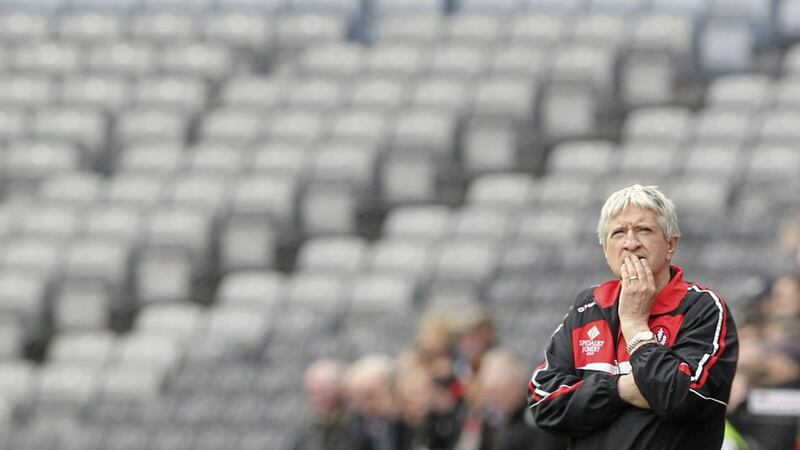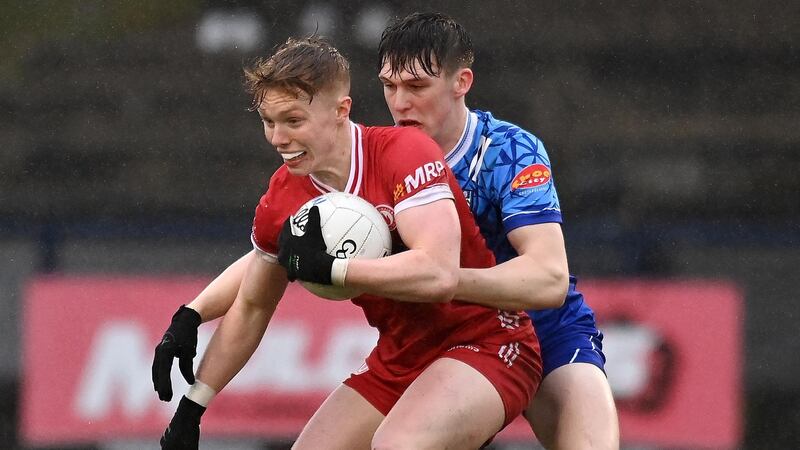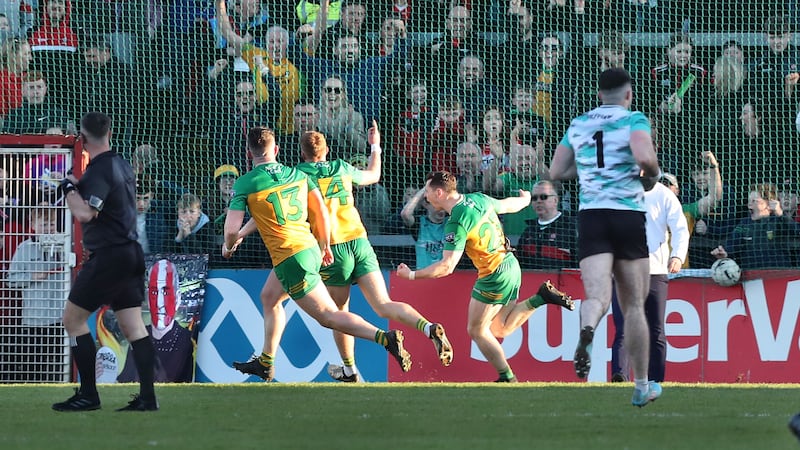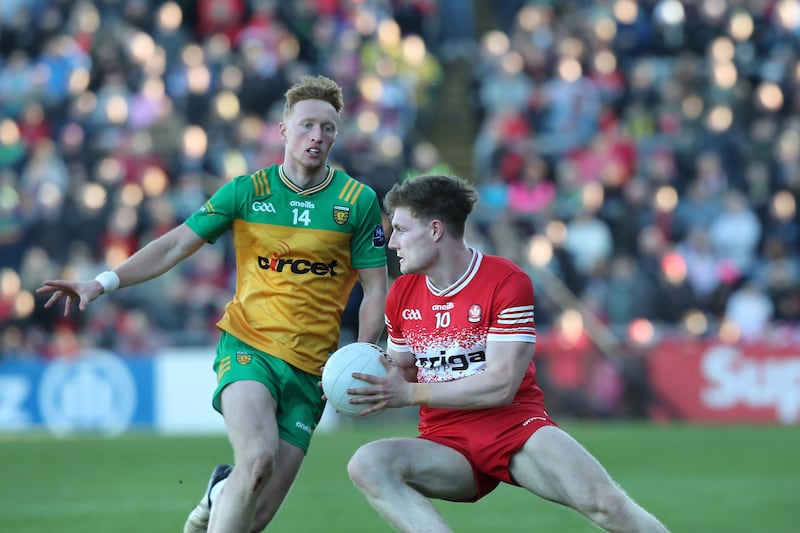YEAH surely… Oh aye, that’ll do great. Aye give me a ring and whatever an’ I’ll get a yarn with ye…
Brian McIver thought he was being wound-up when ‘the Donegal chairman’ rang to sound him out about becoming his county’s next manager.
He was well used to his colleagues at St Pius’s in Magherafelt playing pranks on him. He’d been sent on courses that didn’t exist and serious-looking men had come into his classroom to monitor him teaching history posing as inspectors who weren’t inspectors at all.
Oh yes, the craic was always good and he suspected the pranksters were at it again.
It wasn’t as if he didn’t have the credentials to be a county manager - after all, he’d plotted Ballinderry’s course to the All-Ireland club title - but after missing out on becoming manager of his native Tyrone (Mickey Harte got the job instead) maybe he just didn’t want to get his hopes up?
Luckily, the earnest voice on the other end of the line convinced him to meet for a chat and so Brian went along to the Cohannon Inn to sit down with a real, live Donegal delegation.
“There was no formal interview,” explains Ardboe clubman McIver.
“We just had a chat and whatever and then they rang me later that night and said: ‘If you’re happy enough to take the job, we’re offering it to you’.”
He was, they did and he accepted.
He inherited an easy-come, easy-go Donegal squad full of talented players who needed to move on from the pints-after-training culture. McIver had Ryan Porter in as coach and his son Paul (future KIlcoo manager) helping too and Adrian McGuckin got on board to work with the players one-on-one but the new manager’s patience and man-management skills were well and truly tested in his first season.
“There was very much a social aspect to it and Donegal lads would admit that,” says McIver.
“They hadn’t been successful for a number of years and they didn’t imagine that they could be as good as I always thought they had the potential to be. Gradually they started to buy into it but the biggest fall-out I probably ever had was with Kevin Cassidy.
“In my first year (2006), Donegal were in Division Two and got to the final. The first match against Louth finished a draw and he was out in the lead-up to the replay. I didn’t play him and then he left the panel and headed to Boston.
“He came back the next year and played really well and in my third year he was captain. Once you got Kevin Cassidy sorted and out on the field he was a brilliant player – he would have went through a wall for you, a great lad and I have great time for him.”
By that stage Eamonn McGee was establishing himself as one of the best defenders in the country but the Gweedore man was another who benefitted from his manager’s forgiving nature.
“We played Carlow in that first year and we were travelling down on the Saturday morning to stay over and Eamonn never showed up,” he explains.
“I said to Neil: ‘Where’s Eamonn?’ He says: ‘No idea Brian’. We headed on and the next morning I got a phonecall: ‘Brian this is Eamonn here.”
“I said: ‘Right… Where are you?’
“He says: ‘Don’t ask. But I’m getting into the car now and I’ll meet you down in Clare’.
“I says: ‘Aye, that’s fair enough Eamonn but the match is in Carlow…’
“He turned up but I didn’t play him. That was Eamonn and you couldn’t have but liked him. He was mighty craic and he would have played the shirt off his back for you. Football helped him and he had a bit of success and he’s a great example of how football can give somebody focus and get them on the right track.”
In McIver’s second season, Donegal (who remarkably had lost 13 finals on-the-trot) won their first, and still only, National League. Then in the Ulster Championship they beat Armagh who had been a hoodoo team for them but their bubble was burst by Tyrone
Defeat was “a big let down” but the following season a 17-year-old force of nature arrived on the scene. He would transform the county’s fortunes and his name was… (you know what his name was).
“He came with a totally different attitude of how football should be played and approached and the rest is history,” says McIver.
“I would say Michael Murphy coming in changed Donegal football because his attitude was so good, it was absolutely brilliant. As a 17-year-old lad he had no fear of anybody. He had no fear of taking on anything.
“The first Championship match we played him in, it was against Westmeath in Mullingar, Donegal got a penalty 10-12 minutes into the game. It was a Donegal side that had Rory Kavanagh, Christy Toye, Kevin Cassidy, Colm McFadden and all these fellas but Michael stepped up to take it.
“Michael hit it well but their goalie made a brilliant save. I was on the line thinking: ‘McIver, you are such a silly boy getting a 17-year-old cub on his Championship debut to hit a penalty’. Then about 10 minutes later he got a ball coming in and from the 21-yard line he let fly, top corner, the goalie never moved and I was standing on the line going: ‘This cub’s the real deal’. Missing the penalty made no impact on him at all and thereafter Michael Murphy set the standards for Donegal.”
Derry (who included Brian’s son Michael in their line-up) knocked Donegal out of Ulster in 2008 but with the team pulling together, the future was full of promise. McIver was installed for a fourth season but parochial meddlers wanted a Donegal native at the helm and his tenure came to an acrimonious end when he resigned after an infamous county board meeting. It became known as ‘the night of long knives’.
The players were fuming that he had gone. Karl Lacey said: “Everyone felt that he was the right man to bring us success. A couple of weeks later, he's taken away from us in a way you wouldn't treat a dog.”
McIver explains: “That was a couple of individuals who shouldn’t have been at it, let’s put it like that.
“But any time I run into the Donegal players we would have great chat and I would still have great time for their supporters. I’m not a great person for dwelling on the negativity of things so I moved on and the Donegal boys deservedly got their rewards when they won the All-Ireland.”
Jim McGuinness, who brought order out of chaos after John Joe Doherty replaced McIver, received the plaudits for that Sam Maguire and rightly so, but the seeds for it were sown by McIver who moved on to pastures new at St Mary’s College. He’d studied for a degree at Coleraine, a PGCE at Queen’s and then a Masters in Jordanstown so going to The Ranch, where he began a successful collaboration with Paddy Tally, meant he “been round them all”.
Tally was enticed to join the Down management team by James McCartan and McCartan got two for the price of one when McIver got on board as well in 2010.
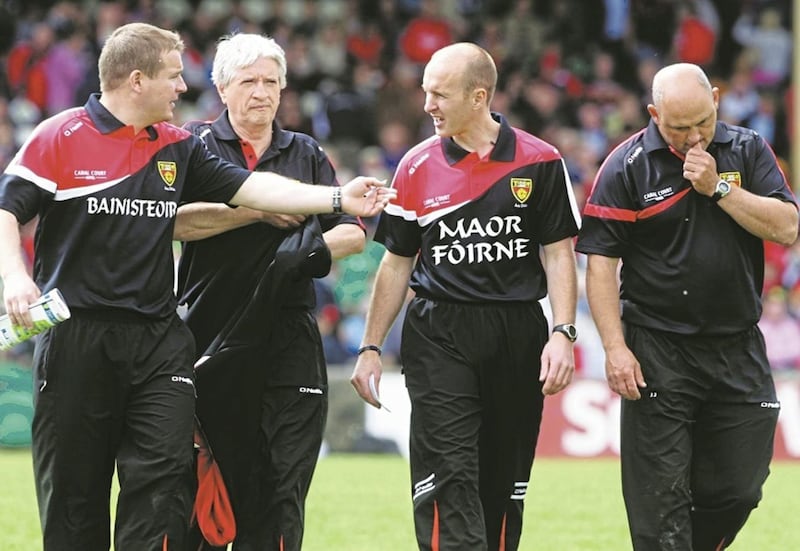
With every passing day, Down’s run to that year’s All-Ireland final becomes more remarkable. The Mournemen came from nowhere to reach the decider against Cork. They came within a whisker of winning the Sam Maguire and since that September Sunday a dozen years’ ago Down has sunk steadily deeper into the list of alsorans.
“’Til the day I die, I’ll say Down would have won the 2010 All-Ireland if Ambrose Rogers hadn’t been injured,” says McIver.
“He got hurt in a club championship game that should never have been played. Down could have lost four or five of their stars and still won but they couldn’t do without Ambrose. He was the driving force, the midfield anchor, he was the man who had the ability to turn defence into attack and he was playing the football of his life. Him being injured cost Down the All-Ireland.”
McCartan’s stature as a county legend, Tally’s enthusiasm and McIver’s calm know-how proved to be the perfect blend and got the best out of a squad that had a formidable mix of talent and experience. The return of Marty Clarke from his Aussie Rules stint with Collingwood was a massive boost for Down.
“Marty brought something to Down football that had been missing,” says McIver.
“His kick-passing was on another planet. Everybody kept saying: ‘Marty Clarke’s not playing the football he was as a minor’ but he was out of the country a good while and you don’t adjust straight away.
“People asked: ‘Why’s he not taking people on? Why’s he not soloing?’ but Marty was winning the ball and pinging 45-yard balls into Benny Coulter’s chest. Benny was going: ‘Jesus, all my Christmases have come at once!’ Once Benny won the ball he had Paul McComiskey and Danny Hughes and these boys to feed off.
“Dan Gordon went to full-back which had been an issue for Down for years and adapted very well. That was a good side. Kevin McKernan was at the top of his game… Down just didn’t get the breaks and that was a negative break losing big Ambrose.”
The end of his time (and Tally’s too although he did return) with Down came at the end of the anti-climactic 2011 season and again McIver doesn’t dwell on his exit.
The following year, with Tally as part of his backroom team, he returned to the inter-county fray as manager of Derry.
“I probably got them two or three years too late,” he says.
“A lot of their really good players were no longer playing or were past their best. At the same time Fergal Doherty came back and was a tremendous influence, Patsy Bradley started to play really well, PJ McCloskey was playing very well.
“A wee bit like the Ambrose Rogers one, Derry lost PJ in the Down game in the Championship and I thought they never really recovered from it. Him, Fergal and Patsy would have given you an unbelievable platform around the middle of the field and we never really got that. I always would have held that if that Derry team could have got that platform, they really could have pushed on but it didn’t happen.”
Derry did reach the National League final in 2014. Three weeks’ earlier, McIver’s men had beaten Dublin at Celtic Park and spirits were high going into the decider especially after Cailean O’Boyle bagged an early goal. But the Dubs reeled them, chewed them up and spat them out.
“Enda Lynn was decked before the ball was thrown-in and all of a sudden it was a real war,” Brian recalls.
“Derry lads were really taken aback from it and never recovered. Like all good teams, once Dublin got a stranglehold on the game they kept it on. It was a good lesson: If you play well this week and go back out three weeks’ later, just doing the same thing again ain’t good enough.”
Derry had good days in the Championship but silverware didn’t come and McIver resigned in frustration, vowing never to return to management, after Derry lost a Qualifier to Galway in Salthill in 2015. Conor Lane’s refereeing performance in that game was the final straw.
“I've stepped down. Totally retired," said a crestfallen McIver after the game.
Seven years’ later, his view hasn’t changed.
“I looked at it and thought: ‘I could not stand on the line and look at refereeing like this ever again’,” he says.
“But I still felt that Derry could improve and the Derry County Board approached me and asked if I would give a hand and organise things in the background and I said: ‘Yes, I would love to see these lads achieving’.
“I would love to see the likes of Chrissy McKaigue, Brendan Rogers, Emmett Bradley and Benny Heron get their rewards this year because they’ve worked as hard as anybody and obviously over the last year they’ve worked even harder to get themselves in the shape they’re in now.
“I was Director of football for three years, trying to get things well organised behind the scenes in terms of Owenbeg, the coaching at development squad level and whatever. I’m taking no credit for it because the structure was very good through everybody involved but it was good to see Derry minors starting to win Ulster titles, go to All-Ireland finals and win All-Ireland finals and there are a lot of good lads coming through.”
The structures he put in place during his time have borne fruit. Derry were in five Ulster minor finals in six seasons from 2015 to 2020 and won the All-Ireland in 2020. Current senior manager Rory Gallagher is reaping the rewards of the hard work put into developing talented players.
McIver cold-called the former Donegal and Fermanagh manager when Damian McErlain stepped down at the end of the 2019 season and was amazed by his in-depth knowledge of Derry football. There were dissenting voices when he was appointed but his results have won over most doubters and any hard-core remainder will be silenced with an Ulster title tomorrow.
“I talked to him and I talked to some of the top people in Ireland about whether they were interested in managing Derry,” says McIver.
“I did the feedback as to who was interested and who was ruled out. Rory knew Derry football and he was interviewed and he got the job. I had contacted a number of Derry boys to get involved and the answer had been ‘no’. People might have felt at the time: ‘There’s enough people in Derry to do this job’ but Rory was the best man for it and he has done a good job.
“When I spoke to him he had already identified a lot of the Derry lads as really good potential. I know that when he looked at the Derry job he thought: ‘A lot of these lads are going to be good players’ and that was very satisfying to hear.”
So will tomorrow be Murphy’s last stand or Derry’s time to shine? McIver has friends in both counties but he doesn’t have a dog in this fight and he’s not going to pick one now.
He’s been around far too long for that…
